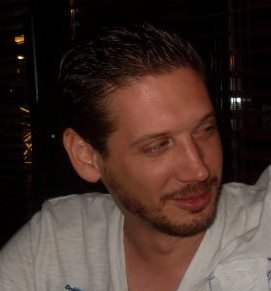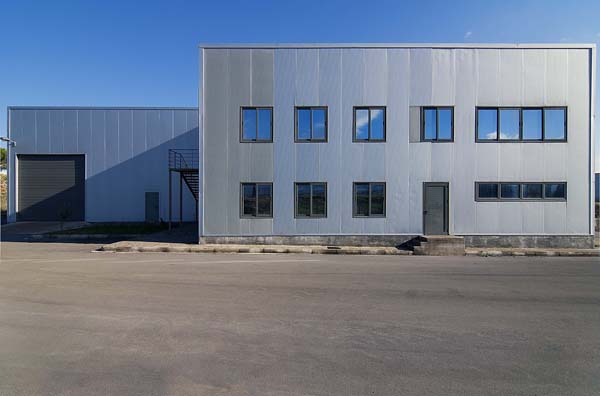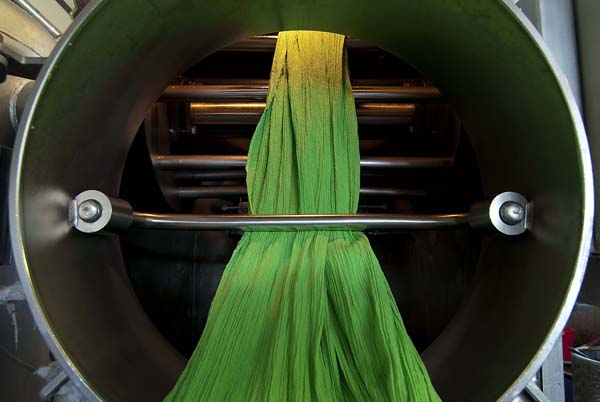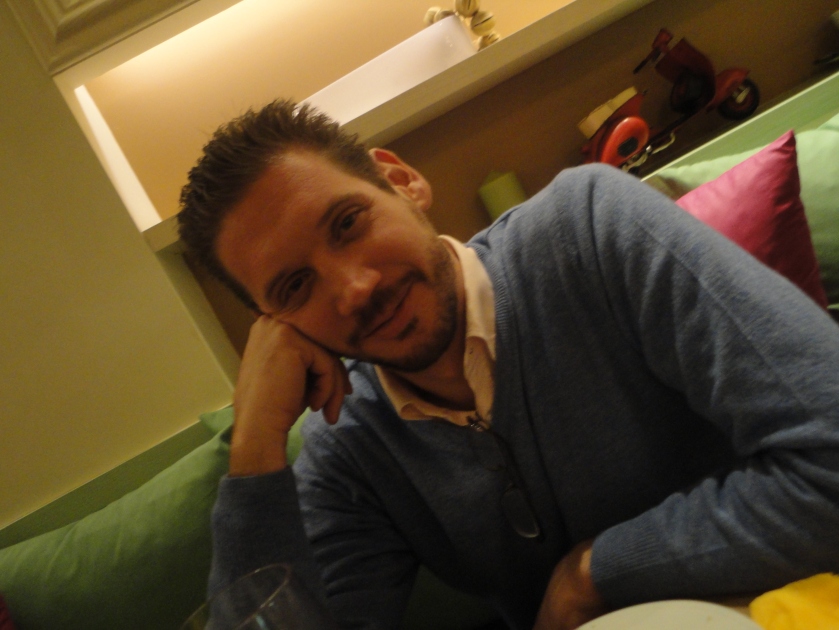Nikos Tsourougiannis is the general manager of family-owned company CHROMICHIMIKI SA which operates in the field of dyeing and finishing of woven fabrics.
Tell us a little about yourself
After my studies in England (at the University of Surrey and the Imperial College of Science) and my military service, I started working in our family business, Chromochimiki SA. Our business is processing woven textiles – dyeing and finishing. My father worked in various dyeing and finishing mills as a chemist and general manager. In 1997, while I was still studying Chemical Engineering in England, we had the chance to open a small fabric dyeing plant; we started from literally nothing, with three production machines. Gradually, taking advantage of every opportunity afforded by the state (subsidies etc.), and by getting bank loans, of course with personal guarantees, we started adding machinery piece by piece.
 In 2003, when the crisis had started and the financial environment was not at its best, we bought a piece of land and built our new plant, against reason as well as against everyone’s advice. On May 2nd 2005, production started in our new factory, with brand new machinery. We believed in ourselves, and in our work, and we have not regretted it, despite everything. Even in 2012, at the peak of the crisis, we continued to invest; we now have 30 employees, having started with 9. Of course, the psychological and financial cost was great, and the workload was massive; but even today we plan on taking advantage of opportunities offered and to continue investing. Apart from my father and myself, there is a strong team, and I would not like to take all the credit – the strength of our company does not lie in the machinery, but in the people running it. I really believe in the human factor; we are all cogs of one machine, and if we don’t take pride in our work, no success is possible.
In 2003, when the crisis had started and the financial environment was not at its best, we bought a piece of land and built our new plant, against reason as well as against everyone’s advice. On May 2nd 2005, production started in our new factory, with brand new machinery. We believed in ourselves, and in our work, and we have not regretted it, despite everything. Even in 2012, at the peak of the crisis, we continued to invest; we now have 30 employees, having started with 9. Of course, the psychological and financial cost was great, and the workload was massive; but even today we plan on taking advantage of opportunities offered and to continue investing. Apart from my father and myself, there is a strong team, and I would not like to take all the credit – the strength of our company does not lie in the machinery, but in the people running it. I really believe in the human factor; we are all cogs of one machine, and if we don’t take pride in our work, no success is possible.
Our clients are either producers of textiles (weavers) or merchants who import from other countries. We treat the fabrics: we dye and finish them (we make them waterproof, oil repellent, flame retardant, etc.) When we started in 1997, our expertise was only in dyeing curtains. Later we expanded into upholstery, tablecloths, terry towels and fashion fabrics, for both men and women’s wear. We were forced into this – the processing cost is much higher, since we had to invest in different kinds of mechanical equipment, a large warehouse, higher labour cost – but business was diminishing, and we needed to keep up our market share.
In a way, this expansion has been beneficial. We are a small but flexible unit which gives us an advantage against foreign competition: for example, as regards dye houses from China – we might be more expensive, but our quality and response delivery times cannot be matched by them.
What were the major difficulties you’ve faced in the last five years?
Where can I start? Mainly the public sector – bureaucracy, delays, taxation, and, of course, the capital controls which make our daily life harder. Bank loans and the cooperation with the Greek banks makes business difficult; the cost of money is very high, social security contributions are crippling. You really have to be a masochist to run a company these days – well, maybe we are!
Another difficulty we have to face is unfair competition, such as imports without any quality control from countries like China, Pakistan and India. Also the monopoly in energy, which makes it very expensive; the cost of energy in Greece is probably the highest in Europe.
Lastly, because of the reduction in Greek production there are no raw materials (such as chemical dyes etc.) to be found locally – everything has to be imported. And now, because of the capital controls, this has become extremely hard.

Did anyone in particular inspire you or help you?
My father. He’s 78 and he still works. I’ve had so many valuable lessons from him – not only in business but life lessons. No studies or degrees can replace that. I was not an ideal student at school, so he always said to me, ‘I don’t care what you’ll become in life – but, whatever it is, even if it’s just collecting rubbish, you have to do it well.’ When I started working, he used to tell me, ‘Your must treat your work like a girlfriend.’ This ethic and values he gave to his family, we have passed on to the staff as well.
My father is the soul of the company – nothing would have been achieved without him. He’s there every day and when we are facing a problem we always ask for his advice. His experience is irreplaceable.
Another person who inspired me and taught me a lot is my first boss, Nikos Kouvaras. I was 14, and I worked in his factory in the summer. He gave me a card that said: “Niko, remember this – two things in life will never betray you, your family and your work.”
What are your hopes/plans for the future?
Difficult to define, but of course I do have hopes and ambitions. We always want to do more, expand, but it’s not easy.
What are your hopes for Greece? What changes do you hope to see happen?
In our sector there used to be around 250 dye houses in Greece. Now there are only 10 -15. Unfortunately, industry in Greece since the 80s has become a scapegoat and is discriminated against.
My view is that a country without industry, without production, is doomed. In Greece industry has been destroyed, and I want to believe that, in the end, it will make a comeback. Even Switzerland, despite high labor costs, has industry. In my country we produce nothing – this has to change.

Have you considered leaving? If so, where would you like to go, and why?
In 2011 we came very close to stopping our production. Finally, we decided to take a big risk, and instead to invest, and it seems to have paid off: we almost doubled our turnover in these years. Leaving the country is the easy solution. I don’t know if circumstances will make us act differently in the future, but as long as we have the willingness and the courage, we’ll fight to stay in Greece.
Where would I choose to go? You’ll think it strange, and perhaps it’s not the best timing to say this, but I would choose North Africa – one of the countries on the Mediterranean. I know at the moment these countries are not politically stable, but, in the future, perhaps this will change. They’re close to Europe and have other advantages. But this is just a future thought.
Are you actively doing anything to help with the situation? Is there something you would like to do?
I believe just the fact that we keep this company going is no small feat. The easy solution would be to close the factory and move somewhere cheaper.
How do you see Greece in 5, 10 years?
Unfortunately, in this country you cannot predict. Eighteen months to a year ago we were literally about to ‘take off’: we’d been offered very big contracts and were ready to sign – but the developments in the political environment changed everything. So what can I say? It’s impossible to foresee what will happen in this country.

How do you cope with obstacles and frustrations in your everyday life?
As regards the professional side, there’s not much you can do but grit your teeth and have patience. Generally I believe in the saying: ‘Where there’s a will, there’s a way.’
What are the positive sides of living in Greece? Have you had any good experiences lately?
Greece is a country with unbelievable opportunities. First of all, the people, the workforce. Despite our faults, Greeks are really hard working, smart, friendly and full of willingness to give and share with other people. The weather, the climate in general and our location which is geopolitically strategic, gives this country and its people the chance to hope and dream for future generations.


Very interesting interview.
LikeLiked by 1 person
What I read about Greece in the papers (which is less now than there used to be) leaves me, alternately, with a sense that everything is collapsing and that everything is carrying on. Thanks for giving us a quick view from the real world.
LikeLiked by 1 person
Like always – some things are collapsing but there’s always people making a stand
LikeLiked by 1 person
These are strange and frightening times. They seem to bring out the best and the worst in people.
LikeLiked by 1 person
If he’s an example of young Greek entrepreneurship, Greece will not merely claw its way out its current situation but will climb out steadily and with dignity. He’s quite an inspiration.
LikeLiked by 2 people
Wish there were more like him! He’s very determined
LikeLiked by 2 people
I’m also impressed that his dad is still working at 78. May we all be robust in mind and body for as long as we can. 🏋
LikeLiked by 1 person
I fell in love with Greece when I visited the country back in ’86 and I had seriously considered doing a work-study program there. It really pains me to see it in such economic hardship. As someone who loves fabric and loves to sew, I’m particularly interested in Nikos’ story and glad to hear that the family business has recovered and is currently doing well.
LikeLiked by 1 person
It makes me happy to see people whose hard work is rewarded. They are truly a huge benefit to keeping the country from falling apart.
LikeLiked by 1 person
That was a really interesting interview. One day I hope to settle in Greece, fingers crossed your country gets back on it’s feet soon.
LikeLiked by 1 person
Yes, I wish it too.
LikeLike
A very good insight this is.
LikeLike
Thanks Hammad!
LikeLiked by 1 person
I really enjoy reading your posts on Greek people, they are always interesting and informative. As we have had our boat in Greece for five years, I am always interested in how Greek people view their country and overcome struggles.
LikeLiked by 1 person
Another interesting interview. Despite all its problems, Greece still seems to have a lot going for it, if the people you interview are representative.
LikeLiked by 1 person
Difficult to know how representative they are. I’m having no trouble finding many interesting people, but I think a lot get bogged down by the administration and relative problems…
LikeLiked by 1 person
Yes, that is one of the themes that’s coming through.
LikeLiked by 1 person
I love these interviews, something so different for us!
LikeLike
Thanks, Lynn, I’m so glad you’re enjoying them. X
LikeLiked by 1 person
It’s so interesting to read about different people and you do a great job!
LikeLiked by 1 person
Great article and the highlight of a positive, enterprising man. I appreciate your invitation to visit your blog. It’s great!
LikeLiked by 1 person
Thank you!
LikeLike
This is fascinating. Love to read about anything to do with textiles.
LikeLiked by 1 person
“The easy solution would be to close the factory and move somewhere cheaper.”. Politics and economics have a way of making things so much harder for people with a real will and courage to do something in and for their own country. I liked reading this interview, it explains a lot and debunks a lot of generalizations I’ve heard flying aound about the … “lazy Greeks”…..
LikeLiked by 1 person
I’m glad. Since starting the series I’ve come across a lot of interesting people. When you have some idle time you should look up the previous interviews…
LikeLiked by 1 person
Yes I will!
LikeLiked by 1 person
cool
LikeLike